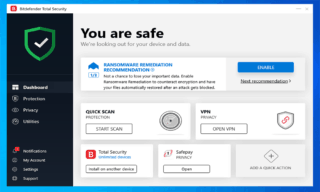


- Bitdefender vs malwarebytes android#
- Bitdefender vs malwarebytes software#
- Bitdefender vs malwarebytes password#
Bitdefender vs malwarebytes software#
System Performanceīecause of its cloud-based deployment nature, Webroot software uses minimal physical space of about 5MB within your computer to function, whereas BitDefender depends not only upon on-premise deployment, it also requires your computer’s 2.5 GB space to operate. Webroot continually monitors your system’s endpoints, offering an instant remedy to any files tagged as malicious, ensuring your system is protected from malware attack before it causes any damage, whereas BitDefender secures your browsing activities through VPNs ensuring your safety from malware and phishing attacks. This gives data on malware activity, from initial entry to its final automatic remediation, whereas BitDefender doesn’t.īitDefender instead counters any digital threats like viruses, trojans, worms, ransomware, spyware, and rootkits, keeping you secure while online, whereas Webroot does not use this technique in its before malware protection. Through its SecureAnywhere Business Endpoint Protection, Webroot offers analytics and visibility to any attacks within the network endpoints. Webroot automatically keeps itself up to date with the additional advantage of being accessible from a single console spread across different locations, whereas BitDefender easily secures multiple internet-connected devices from just one product. Webroot is a cloud-based solution and does not need, from the customer’s end, any constant updates or definitions once deployed, whereas BitDefender relies upon an on-premise deployment. Webroot leverages its AI, machine learning, and massive data analytics to monitor and identify malware activities, preventing it on its track before it attacks your system.
Bitdefender vs malwarebytes password#
Whereas Webroot and BitDefender have similar features like Password management, performance optimization, BitDefender protects both your webcam and microphone, whereas Webroot only protects the webcam.īitDefender extra features like real-time app monitoring, file shredder, VPN encryption and compatibility across multiple devices, anti-tracking, and banking data protection stand out, whereas Webroot features like identity protection, Mobile security, real-time Anti-phishing, quick scans, and automatically encrypted storage appeals to many clients.

In contrast, BitDefender is an anti-virus and cybersecurity solution that covers the security of small businesses, homes, and enterprises from online attacks. Webroot is an innovative software that leverages its AI predictive technology to provide endpoint protection. Webroot and BitDefender features are designed differently as we shall discuss below Design Functionality BitDefender support is easily accessible via email, phone, live support, and training, whereas they limit customer support to email, phone, and tickets in Webroot.Įxploring Webroot vs BitDefender features.BitDefender has more features that offer clients enhanced service quality than the number of features.
Bitdefender vs malwarebytes android#

04:59 am GMT Main Differences Between Webroot vs BitDefender


 0 kommentar(er)
0 kommentar(er)
